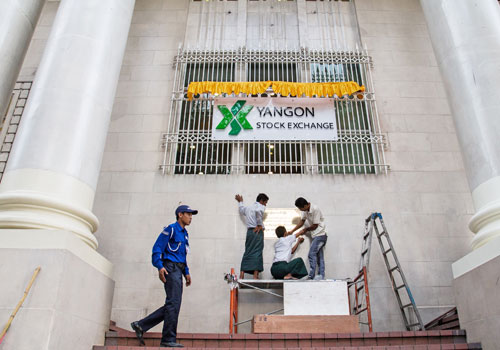Over-the-counter share prices rise ahead of Myanmar's new stock exchange launch
10 ธันวาคม 2558
The stock exchange opens in Yangon today, though its opening is likely to be just symbolic, as underwriters are not yet ready to operate and companies are not ready to list.
There has been much speculation about which companies will attempt an initial public offering, or IPO. No announcement has yet been made about which applicants have met the listing criteria, but the first handful are expected to be made public today at the launch of the exchange.
Meanwhile, demand has risen for shares in companies that have publicly indicated their intention to debut on the exchange. Investors believe First Myanmar Investment will be among those named, and the company’s owner, businessperson Serge Pun, has repeatedly said his company is ready.
Of all Myanmar’s tycoons, Mr Pun is the most familiar with the workings of a modern stock exchange – his real estate-focused Yoma Strategic is the only Myanmar conglomerate to successfully list overseas, and trades on the Singapore Exchange.
The price of shares in FMI had climbed to K18,500 in early December, from K10,000 this time last year, according to the company’s website, while a broker who sells FMI shares said the market price is between K20,000 and K22,000. Shareholders have been unwilling to sell for the past few months, as the opening date for the new exchange nears, he said.
“This may be because customers are trading directly, or keeping their shares until the company is re-valued,” he said. In January 2014, FMI issued 2.5 million additional shares to the public, at K10,000 each.
Shares are traded over-the-counter which involves going through a broker or making a trip to the company’s headquarters and waiting until a counterparty is found.
Another company likely to list, Myanmar Thilawa SEZ Holdings Public (MTSH), is also in high demand. When the company went public in February last year, the K21 billion (US$16.3 million) deal was 2.5x oversubscribed and its share price jumped from K10,000 to K15,000 soon after listing.
The price of shares in MTSH had risen to K50,000 before trading closed in late November. Trading will resume on December 20, said a company spokesperson.
Meanwhile, shares in Myanmar Citizens Bank (MCB) sold out just three months after it announced plans to list on the new exchange. The company is one of two registered at the Myanmar Securities Exchange Centre (MSEC) which opened in 1996. The other is Forest Products Joint Venture Corporation.
DawSweSweMyint, general manager of MCB, said the bank has been selling shares at K5000 while the market price is K6000.
“All the shares were sold between one and three months after we announced our plans in the newspaper,” she said. “We are waiting for the official announcement, and will hire securities companies as soon as we get the green light.”
MCB has applied to the Yangon Stock Exchange and prepared the necessary documents to list, she said.
Existing shares in other companies such as Mandalay Myotha Industrial Development Public Company, Golden Myanmar Airlines, Myanmar Agri-Business Public Corporation (MAPCO), and banks including First Private Bank and Global Treasure Bank Public Company are also sought after, said one Yangon based trader.
Asia Green Development Bank, which has around 601,000 outstanding shares worth K50,000 each has almost finished putting together its prospectus for the YSX, and is preparing to launch an initial public offering, subject to regulatory approval, as previously reported by The Myanmar Times.
When companies start to list, it will be the first time investors will find out the true value of their holdings. In the past, the valuation of new share offerings by public companies is sometimes “as crudely done” as adding 10 percent to the offering price of the previous year, said U AungThura of Thura Swiss consultancy.
Myanmar has over 200 public companies, but many do not meet the listing criteria for the YSX, said former MSEC director U SoeThein. Most do not separate shareholders from management, he said, adding that timely information disclosure and good corporate governance is often lacking.
“There will be disputes and manipulation through insider trading if the companies do not disclose enough information to encourage a level playing field,” he said, adding that investors still need experience.
For U AungThura, in the past, public companies could operate without much oversight. While FMI has improved its reporting standards this financial year, he said, many other companies do not yet report to an international standard.
The Securities Exchange Law outlines rules for prospectuses, stating that companies must disclose required information such as their history, market position and the risks involved before attempting a listing.
The Securities and Exchange Commission must help by ensuring it fulfills its role as a regulator, said U SoeThien. “It should keep away from performing functions within the exchange, and make sure it keeps an eye on listed companies,” he said.
Laws and regulations governing the security of software used on the exchange also need to be strengthened, he said. Daiwa Institute of Research is providing the hardware for the exchange.
U ThetTunOo, a director at MSEC, said rules will be strengthened once the market has launched, adding that it will take some time before operations are fully up and running. The first IPOs will not be launched until underwriters, brokers and dealers have been granted licences, he said, adding that this process has not yet started.
Ten securities companies intend to operate as underwriters, with licences dependent on registering a subsidiary with the Directorate of Investment and Company Administration and putting up K15 billion (US$11.5 million) in initial capital.
The exchange is 49 percent owned by two Japanese companies – Japan Exchange Group, the operator of Tokyo Stock Exchange, and Daiwa Securities Group, which signed an agreement with majority owner state-owned Myanma Economic Bank (MEB) on December 23 last year.Reference: http://www.mmtimes.com/index.php/business/18041-over-the-counter-share-prices-rise-ahead-of-new-stock-exchange-launch.html











